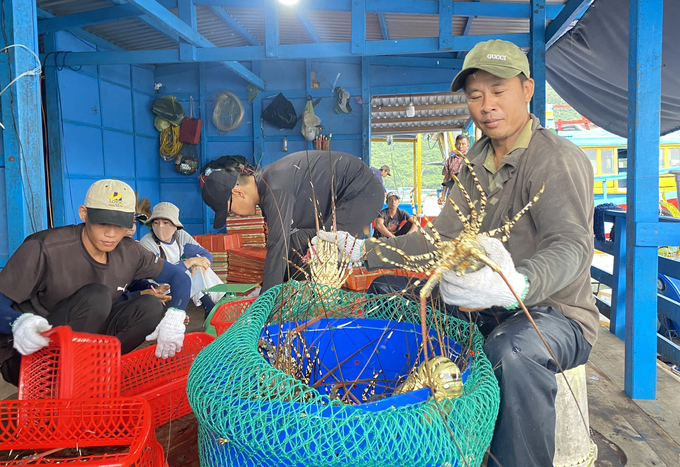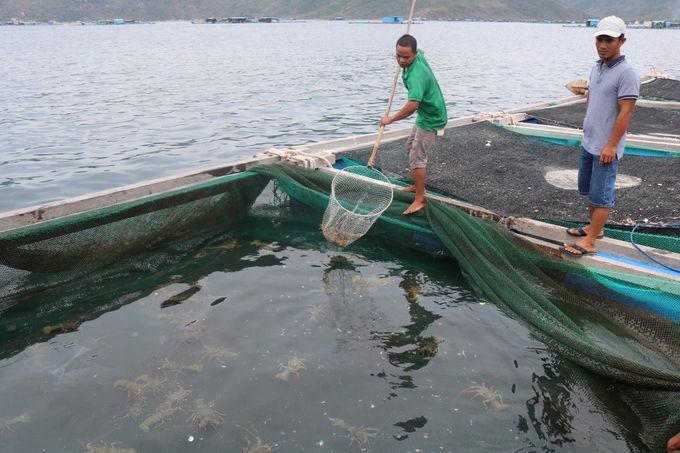May 21, 2025 | 03:49 GMT +7
May 21, 2025 | 03:49 GMT +7
Hotline: 0913.378.918
May 21, 2025 | 03:49 GMT +7
Hotline: 0913.378.918
Exchanging views with the Vietnam Agricultural Newspaper on the recent challenges in the export of local ornate rock lobsters to the Chinese market, Deputy Director of the Department of Quality, Processing, and Market Development (Ministry of Agriculture and Rural Development) Le Ba Anh stated that the registration of the list of facilities packaging ornate rock lobsters, as well as the issuance of certificates for exported batches of ornate rock lobsters, is carried out in accordance with China's food safety regulations. The enforcement of these food safety requirements on the Chinese side is overseen by the General Administration of Customs.

Mr. Le Ba Anh, Deputy Director of the Department of Quality, Processing and Market Development (Ministry of Agriculture and Rural Development), said that removing difficulties for exporting ornate rock lobster to the Chinese market in the short term is difficult. Photo: Hong Tham.
The Chinese General Administration of Customs comprises two units, namely the Bureau of Import and Export Food Safety and the Department of Supervision on Animal and Plant Quarantine. Historically, Vietnam has been required to register facilities packaging crabs, lobsters, prawns, mantis shrimps, and other live products destined for China to comply with food safety regulations. For aquatic products, registration is done with the Food Safety Bureau, while live animals undergo registration with the Department of Supervision on Animal and Plant Quarantine.
Currently, Vietnam has 57 facilities approved by the Department of Supervision on Animal and Plant Quarantine for exporting live products to the Chinese market. Among them, 46 facilities are authorized to export live ornate rock lobsters (green lobsters and ornate rock lobsters) to China.
Export of Vietnamese ornate rock lobsters to China during the first 7 months of 2023 proceeded normally, with fluctuations attributed to supply and demand factors. Starting in August, some Vietnamese enterprises reported that Chinese businesses ceased purchasing ornate rock lobsters without clear reasons.
In early September, the Department of Quality, Processing, and Market Development sent a letter to the Trade Office and the Embassy of Vietnam in China, requesting assistance in gathering information on China's new measures and regulations. Also, in September, the department issued a notice to domestic live seafood export businesses to be aware of this information and proactively plan production. The department encouraged enterprises to actively engage with Chinese counterparts for further understanding, although no official information was received from the Chinese side.
The Department of Quality, Processing, and Market Development also sent a letter to Chinese Customs, including Nanning Customs, requesting information on any new policies and regulations from China. During the implementation of these potential new policies, efforts will continue to create favorable conditions for the normal import and export of ornate rock lobsters between the two countries.
In September and October 2023, the Department of Quality, Processing, and Market Development maintained continuous communication with the Vietnam Trade Office in China and the Embassy of Vietnam in China, seeking support in arranging discussions with the General Administration of Customs in China.

The problem with exporting ornate rock lobster to China recently is not customs procedures or food safety or animal quarantine. Photo: Kim So.
Following the department's request, on November 10, 2023, the Vietnam Trade Office in China initiated an online meeting between the General Administration of Customs in China (Animal and Plant Quarantine Monitoring and Inspection Department; Customs of importing provinces for ornate rock lobster from Vietnam: Shenzhen, Guangzhou, Nanning) and Vietnam's representatives (Department of Quality, Processing, and Market Development; Directorate of Fisheries; Trade Office, Sub-Department for Africa, West Asia, South Asia - Ministry of Industry and Trade) to discuss the situation of ornate rock lobsters lobster exports to China.
During the online meeting, the Chinese side conveyed information that, in 2021, China amended the List of Endangered Wild Animals in Need of Protection, placing ornate rock lobster lobsters under Level 2 protection (effective from February 1, 2021). Since May 2023, China has amended the Wildlife Protection Law, prohibiting the capture, use, and trade of species listed in the Endangered Wild Animal List, including ornate rock lobsters.
According to Mr. Ba Anh, based on your information, following the effective implementation of the Wildlife Protection Law, the General Administration of Customs in China directed customs checkpoints to comply with the law. This includes the requirement for Chinese importers to obtain a permit from the Fisheries Bureau (Ministry of Agriculture of China) for the import of seafood species listed in that category.
Chinese importers themselves are not allowed to import without the import permit issued by the Chinese authorities, leading to a halt in purchasing from exporters, including those in Vietnam. The recent challenges in exporting ornate rock lobsters to China are not related to customs procedures, food safety, or animal quarantine but involve the enforcement of wildlife protection laws, as affirmed by the leadership representative of the Department of Quality, Processing, and Market Development.

Faced with difficulties from the Chinese market, it is necessary to strengthen the promotion of lobster consumption in the domestic market and other countries. Photo: Kim So.
To address the challenges in the export of ornate rock lobsters, the Department of Quality, Processing, and Market Development has communicated with the Directorate of Fisheries, proposing two issues: directing local authorities to compile a list of facilities breeding ornate rock lobsters in compliance with both Vietnamese and Chinese laws, and continuing dialogue with the Fisheries Bureau of China to understand and clarify the List of Endangered Seafood Species requiring protection and related management regulations. This guidance aims to instruct localities and businesses in their implementation.
Simultaneously, the Department of Quality, Processing, and Market Development has issued communications to facilities packaging ornate rock lobsters for export to China, requesting them to provide complete information on packaging facilities and breeding establishments. The registered breeding facilities must comply with both Vietnamese regulations (regarding aquaculture) and Chinese regulations (concerning breeds and cultivation processes).
Mr. Ba Anh mentioned that immediately upon receiving the list of registered packaging facilities exporting ornate rock lobsters to China, the Department of Quality, Processing, and Market Development will cross-reference it with the list of breeding households previously directed and validated by the Directorate of Fisheries. The department will promptly submit the registration to the Chinese authorities for those packaging facilities and breeding establishments that meet the necessary requirements.
Translated by Linh Linh

(VAN) In 2024, over 295 million people across 53 countries and territories faced acute hunger—an increase of almost 14 million people compared to 2023, while the number of people facing catastrophic levels of hunger reached a record high.

(VAN) World Environment Day 2025 (June 5) carries the theme 'Beat Plastic Pollution' continuing to emphasize the global urgency of addressing the plastic waste crisis.

(VAN) This was the assessment shared by experts at the workshop titled 'Assessing the Role and Potential of Low-Emission Rice Production Systems in Vietnam,' held on the morning of May 19.

(VAN) Cai Rong Port is the fisheries control center of Quang Ninh, helping to monitor fishing vessels, combat IUU fishing, and remove the EC's 'yellow card'.

(VAN) The German Agricultural Society (DLG) explores the possibility of establishing a mechanization service center in Vietnam’s Mekong Delta to support farmers in accessing and utilizing advanced machinery.

(VAN) On May 16, the Department of Water Resources Management, in collaboration with the Food and Agriculture Organization of the United Nations (FAO), held a signing ceremony for the GEF-8 project document.

(VAN) Food safety, mechanization, vocational training, and market opening are key areas of cooperation expected between the Vietnamese Government and the Federal Republic of Germany.